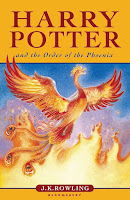 |
| (Amazon UK link) |
It's an exciting read, even when I knew exactly what was coming. I think I enjoyed it more than last time, too. I wasn't so annoyed by Harry's teenage angst and irritation at being kept in the dark; I could sympathise with him more, this time.
It's a fairly dark book, much more for teenagers than children, though as a successful 'crossover' book it seems to reach all audiences from six to sixty, and beyond. Yet there's humour too, and light touches, and a fast pace that makes it very readable. Over six hundred pages, and I finished it by Saturday evening.
It's an important book in the series, or so it seems to me. The fourth book - Harry Potter and the Goblet of Fire - charts the rise of the evil Lord Voldemort to power, witnessed by a reluctant Harry in a very unpleasant graveyard scene. 'Harry Potter and the Order of the Phoenix' shows how the wizarding world has had to change as a result. There are some who have found a 'safe house' to protect those in most danger, and to work out what they can do to reduce Voldemort's power.
Others, including the official government spokesman, refuse to believe it at all. They consider Harry to be an attention-seeking liar, and his headmaster Professor Dumbledore (who believes him) to be almost senile.
So there are power struggles within the school, including the introduction of the sadistic Dolores Umbridge, put there by the Minister of Magic to attempt a take-over. There's humour from the Weasley twins, beginning their career as joke shop owners, and pressure on all the students as they approach their 'OWL' exams (roughly equivalent to GCSE or O-level in the UK system). There's also Harry's private struggle with nightmares and worries about his godfather, and his resentment that nobody seems to want to tell him what's going on.
We learn more towards the end, after a highly-charged battle between the forces of good and the forces of evil, and the way is open for a dramatic finale to the series in the last two books.
Recommended - although it's much better to have read all the preceding books first - to anyone over the age of about ten. No doubt it has been read by many much younger children, but some may find it frightening, others may find it over their heads. Harry and his friends are fifteen in this book, and beginning to think like young men and women.
No comments:
Post a Comment